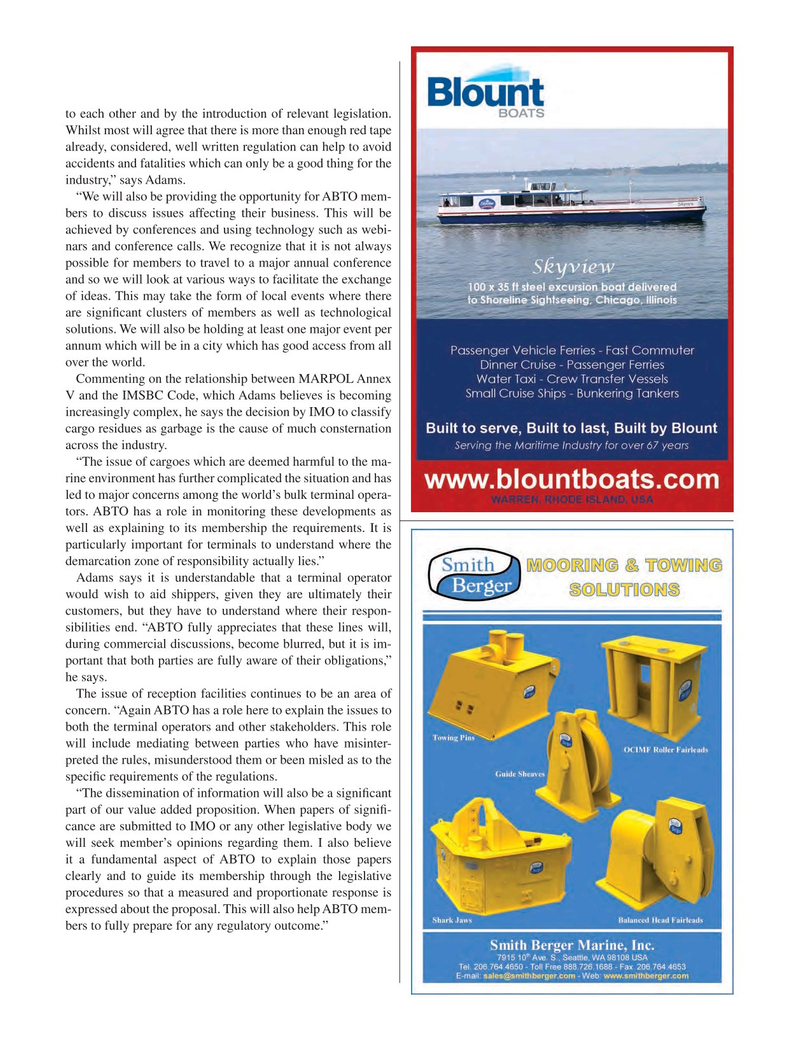
Page 27: of Maritime Logistics Professional Magazine (Q3 2016)
Shipbuilding, Repair & Maintenance
Read this page in Pdf, Flash or Html5 edition of Q3 2016 Maritime Logistics Professional Magazine
to each other and by the introduction of relevant legislation.
Whilst most will agree that there is more than enough red tape already, considered, well written regulation can help to avoid accidents and fatalities which can only be a good thing for the industry,” says Adams.
“We will also be providing the opportunity for ABTO mem- bers to discuss issues affecting their business. This will be achieved by conferences and using technology such as webi- nars and conference calls. We recognize that it is not always possible for members to travel to a major annual conference and so we will look at various ways to facilitate the exchange of ideas. This may take the form of local events where there are signi? cant clusters of members as well as technological solutions. We will also be holding at least one major event per annum which will be in a city which has good access from all over the world.
Commenting on the relationship between MARPOL Annex
V and the IMSBC Code, which Adams believes is becoming increasingly complex, he says the decision by IMO to classify cargo residues as garbage is the cause of much consternation across the industry. “The issue of cargoes which are deemed harmful to the ma- rine environment has further complicated the situation and has led to major concerns among the world’s bulk terminal opera- tors. ABTO has a role in monitoring these developments as well as explaining to its membership the requirements. It is particularly important for terminals to understand where the demarcation zone of responsibility actually lies.”
Adams says it is understandable that a terminal operator would wish to aid shippers, given they are ultimately their customers, but they have to understand where their respon- sibilities end. “ABTO fully appreciates that these lines will, during commercial discussions, become blurred, but it is im- portant that both parties are fully aware of their obligations,” he says.
The issue of reception facilities continues to be an area of concern. “Again ABTO has a role here to explain the issues to both the terminal operators and other stakeholders. This role will include mediating between parties who have misinter- preted the rules, misunderstood them or been misled as to the speci? c requirements of the regulations.
“The dissemination of information will also be a signi? cant part of our value added proposition. When papers of signi? - cance are submitted to IMO or any other legislative body we will seek member’s opinions regarding them. I also believe it a fundamental aspect of ABTO to explain those papers clearly and to guide its membership through the legislative procedures so that a measured and proportionate response is expressed about the proposal. This will also help ABTO mem- bers to fully prepare for any regulatory outcome.” 18-33 Q3 MP2016.indd 27 8/17/2016 11:32:24 AM

 26
26

 28
28
